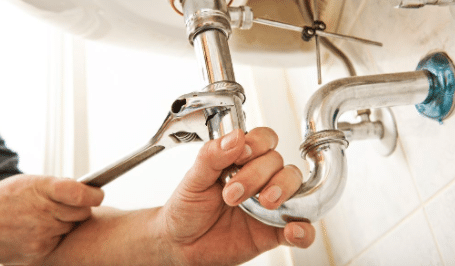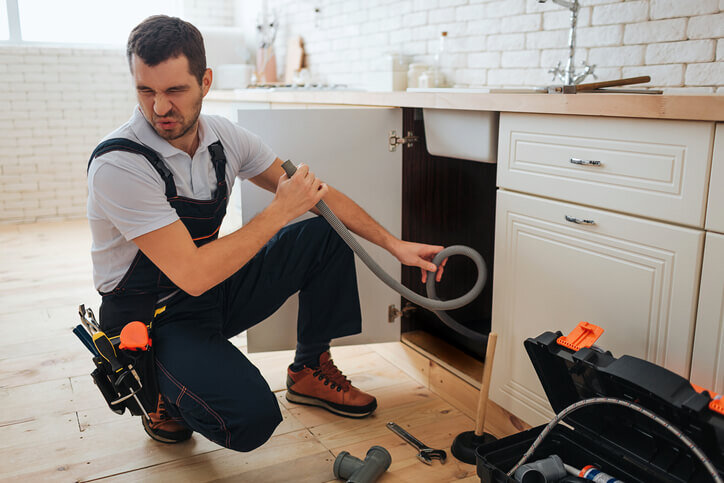Six Important Habits You Should Eliminate To Preserve The Plumbing Systems
Six Important Habits You Should Eliminate To Preserve The Plumbing Systems
Blog Article
How do you feel on the subject of Can Hard Water Ruin Your Appliances??

The secret to long lasting devices, unsurprisingly, is proper upkeep. There's no hard and fast regulation that can guarantee your plumbing appliances a lengthy wear, but you can protect against unneeded damages and also repairs by staying clear of bad plumbing routines.
You need to stop doing these 6 things else you'll keep calling your plumber over for minor faults.
Purging whatever
Yes, your toilet drainpipe brings about the drains, but that doesn't indicate you ought to unload just anything down the drain. Lots of 'flushable' products are actually great blockage beginners, for example dental floss. Asides maintaining noticeable non-flushable materials like wires as well as plastics out of your commode, you should also avoid flushing cotton buds, menstrual items, wipes, daipers and also prophylactics down the commode drainpipe.
Putting oil in the sink
We understand effectively getting rid of grease after a hearty meal is a pain. But simply putting it down the tubes can do long-lasting harm to your pipes. "The fat and also oil can block your drain badly adequate to compel you to call a plumber," describes Dawson. "Plumbing works best when it's well cared for-- not abused with oil."
Utilizing too much drainpipe cleaner
Using a drainpipe cleaner more than once or twice a month is a sign that something serious is taking place within your pipelines. Now, as opposed to encountering the main concern, you go with a quick fix; a carbonated drain cleaner. Rightfully, a drain cleaner will care for the blockage, yet at what price?
The chemicals in a drain cleaner can quicken the corrosion of your pipelines. Include that to whatever underlying trouble is creating the obstruction and you may have to a severe issue on your hands.
If you experience a lot of obstructions, call your emergency plumber instead of making use of a drain cleaner.
Not washing recipes before packing them right into the dishwashing machine
it's called a dishwashing machine, yet tossing in dishes, pots, and also pans covered in huge food particles can actually trigger some serious damages to the device, resulting in long-lasting issues down the line. "Property owners might have to obtain their dish washer repaired regularly if they do not rinse their dishes before loading, or at the very least get rid of larger food pieces," discusses Audrey Monell, proprietor of Forrest Anderson Plumbing as well as AC in Glendale, Arizona. "Food that obtains stuck on dishes creates the dishwashing machine to function harder, which can wear down parts much faster, resulting in issues."
DIYing whatever
With plumbing, a stitch in time really does conserve 9. You can avoid a fullblown plumbing emergency by calling your plumber at the correct time.
You might have learnt a few plumbing hacks from your papa, but you should certainly know where to draw the line as well as call a specialist. For example, you may be able to deal with a clog yourself, but you shouldn't try to transform a pipe. You can mismatch pipes or overtighten a screw, creating more injury and damage than you assumed. Calling a plumber is a safe and inexpensive choice.
Not transforming your dishwasher hoses
One very easy means to make certain that you utilize your dishwashing machine for years is to replace the tube at the very least once in five years. This likewise makes an application for washing maker hose pipes.
Over time, food particles, soap and oil can create blockages within your pipelines. Replacing them on time will certainly stop any presure accumulate that can harm the inner operations of your dishwasher or cleaning equipment.
A reinforced steel entwined hose pipe does a terrific work of prolonging your equipment's use time.
No winter preventative measures
Extreme weather misbehave for your pipelines, specifically if they're made from steel. You need to insulate your revealed pipelines, and also your water storage tank, even if you have a hot water heater. You should also turn off your yard tube shutoff as well as any other external water networks. These channels are electrical outlets for chilly; you pipes can begin to freeze from outdoors if you don't.
Prevent Water Damage from Plumbing and Appliances
Prevent toilet failure
Be patient after you flush and wait for the valve to completely finish refilling the tank and bowl. If an overflow looks imminent, lift off the tank cover and lift the float to shut off water flow to the tank, and then turn off the supply valve.
Twice a year, inspect a toilet’s components, such as the fill, supply, and flush valves, and the supply line. Make sure you can turn off the supply. If you have older screw type valves that are hard to turn or start leaking, consider replacing them with simpler ball valves that are easy to shut off quickly.
Inspect and maintain your water heater
Inspect your anode rod every two years, or every year once the warranty has expired, to determine if it needs to be replaced.
Flush water heater tanks every six months to remove sediment by attaching a garden hose to the valve at the base. For safety, first turn off the power and run hot water until it is cool.
Get an annual inspection from a plumbing professional including the shut-off valve and all piping. Signs of broken valves and loose or wet joints and rust are a sign that more severe damage is coming.
Maintain washing machine supply lines
Look for signs the supply hose may be ready to fail—blisters in the hose, worn tubing, stress cracks, or a loose connection.
Replace the supply hose with a reinforced steel braided hose if it shows any sign of wear.
Tighten the connection if it feels loose. The most common site of failure is near the connection where the hose bends.
Replace supply hoses every five years, even if there is no obvious deterioration or wear. Some signs of deterioration may occur from the inside out and may not be visible until it is too late. When replacing washing machine supply hoses, always choose a reinforced steel braided hose over the traditional un-reinforced rubber hose. These hoses will last longer and are far less likely to result in a catastrophic water loss.
Prevent plumbing failure
Never pour grease down the drain.
Plant trees away from lateral drain lines to prevent roots from damaging piping.
If your home’s sewer system is connected to the city’s sewer system—a particular problem for older homes—or if you are located downhill or below street level, contact a plumbing professional to install a backflow prevention assembly into your sewer system.
Call a professional if you notice signs of a plumbing problem—an increased monthly water bill, banging pipes, rust stains, moisture in the walls or on the floor, and signs of wet soil erosion near the foundation.
https://disastersafety.org/maintenance/prevent-water-damage-from-plumbing-and-appliances/

We hope you enjoyed reading our piece about Can Hard Water Ruin Your Appliances?. Thanks so much for taking the time to read our blog post. Sharing is nice. You just don't know, you may very well be helping someone out. I thank you for reading our article about Can Hard Water Ruin Your Appliances?.
Request Service Report this page